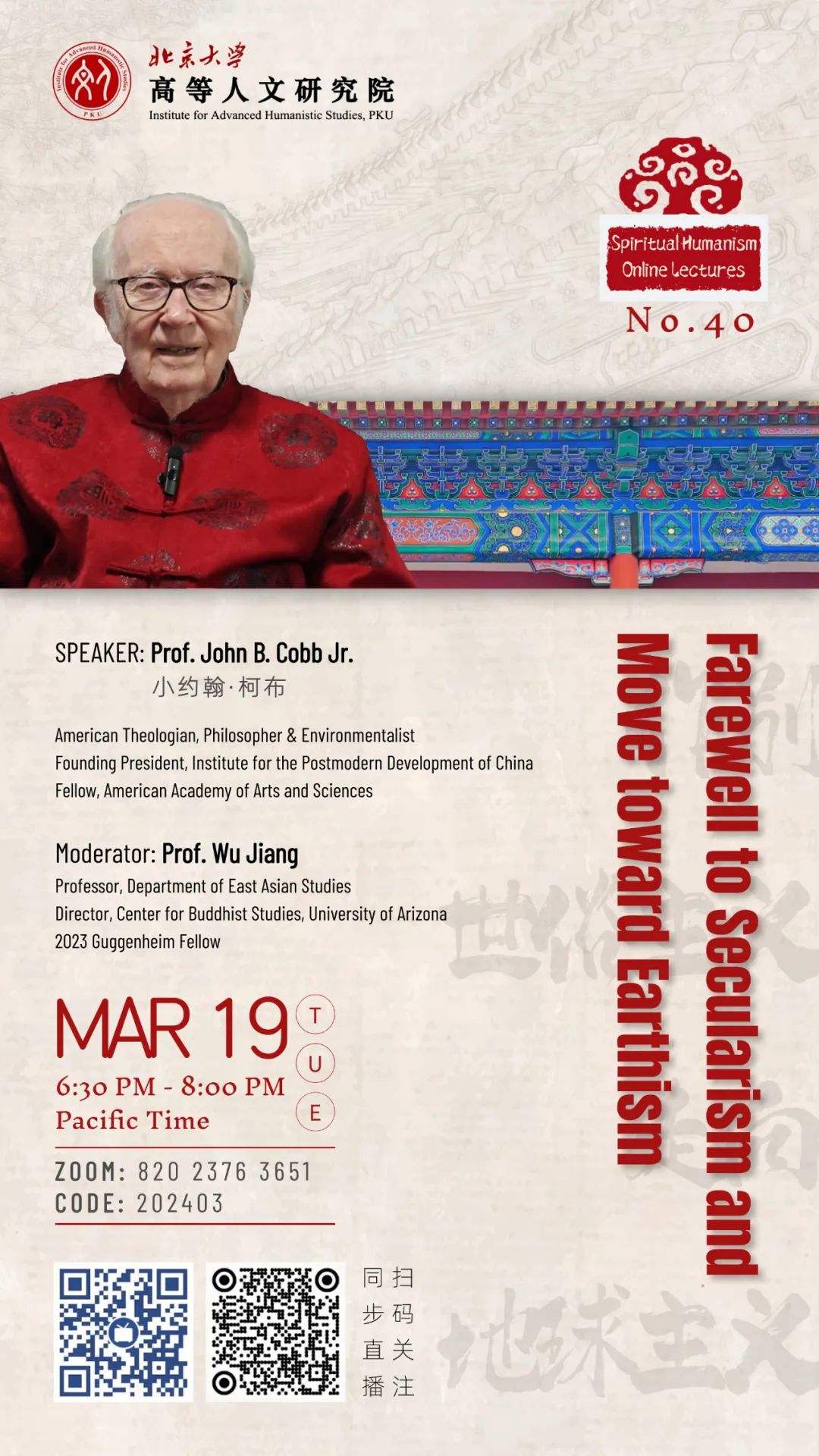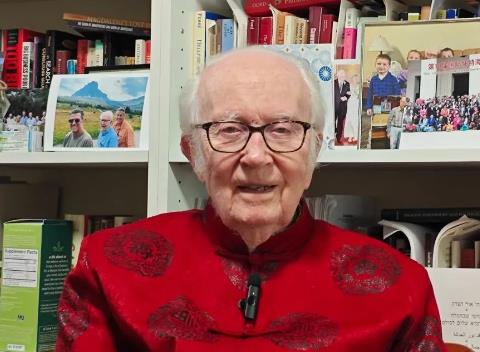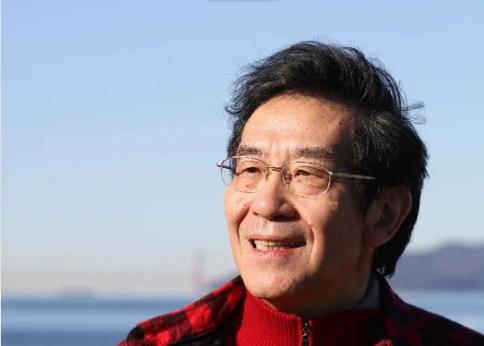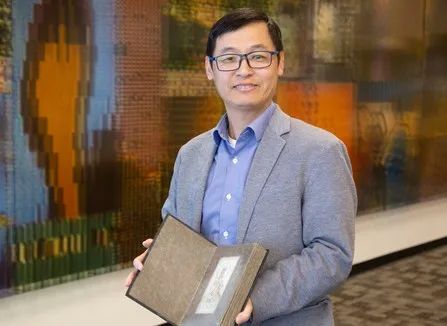

Farewell to Secularism
Move toward Earthism
作别世俗主义,走向地球主义
Time&Date
Pacific Time
6:30PM-8:00PM, Tuesday
March 19, 2024
Platform
Zoom ID: 820 2376 3651
Code: 202403
Live Streaming
Wechat Videos【北京大学高等人文研究院】

Blibli.com【北大高等人文研究院】

Blibli.com【全球研究论坛】

Scan the QR code to Sign up
Youtube频道【全球研究论坛】
Host
Institute for Advanced Humanistic Studies
Peking University
SPEAKER

John B. Cobb Jr.
小约翰·柯布
Dr. John B. Cobb Jr. is an American theologian, philosopher, and environmentalist born on February 9, 1925. He is one of the pioneers of process theology and has made significant contributions to ecological ethics, interfaith dialogue, and the intersection of religion and science. He has also been active in various social and political causes, including civil rights, peace activism, and environmentalism.
Several earlier works established him among the very few most notable thinkers making process philosophy the principal philosophical resource for a distinctive option in Christian theology. Pioneered the importance of this philosophy and theology for sustained analysis of major social problems, especially environmental issues and, subsequently, those of economic order, publishing in each case major works coauthored by a scholar in the relevant correlate discipline. In 1973, cofounded the Center for Process Studies, for which he provided principal intellectual leadership and in which the neoclassical metaphysics of Alfred North Whitehead and Charles Hartshorne were fostered and tested in discussion with representatives of numerous other fields of study, including physics, political theory, and gender studies. Through orchestration of conferences and his own academic achievements, the Center evoked in Europe and Asia, especially in China and Japan, extensive scholarly attention to process philosophy and its consequences for contemporary thought.
His many books currently in print include: Reclaiming the Church (1997); with Herman Daly, For the Common Good; Becoming a Thinking Christian (1993); Sustainability (1992); Can Christ Become Good News Again? (1991); ed. with Christopher Ives, The Emptying God: a Buddhist-Jewish-Christian Conversation (1990); with Charles Birch, The Liberation of Life; and with David Griffin, Process Theology: An Introductory Exposition (1977).
PARTICIPANT

Tu Weiming
杜维明
Tu Weiming, founding director of the Institute for Advanced Humanistic Studies at Peking University as well as research professor and senior fellow of Asia Center at Harvard University, where he taught from 1981 to 2000. Tu is also a fellow of the American Academy of Arts and Sciences, a titular member of International Institute of Philosophy amd Academician at Sinica.
For over 50 years, Professor Tu Weiming has devoted himself to the interpretation of Confucian Classics, to the evaluation of Confucianism from a perspective of cultural diversity in the world, and to the revival of Chinese culture by a creative transformation of the ancient tradition. The intellectual activities and academic discourses advocated by him, such as “Cultural China”, “Civilizational Dialogue”, “Reflections on the Enlightenment”, and “the Third Phase of Confucianism”, have rendered profound influence in the international circle of thoughts.
Tu is the author of Neo-Confucian Thought in Action: Wang Yangming’s Youth (1976), Centrality and Commonality: An Essay on Confucian Religiousness (1976, rev.1989), Humanity and Self-Cultivation (1979), Confucian Thought: Selfhood as Creative Transformation (1985), Way, Learning, and Politics: Essays on the Confucian Intellectual (1993), Confucianism (2008), the Global Significance of Concrete Humanity: Essays on the Confucian Discourse in Cultural China (2010), Confucianism in the 21st Century (2014), etc.
Moderator:

Wu Jiang(吴疆)
Jiang Wu, a professor in the Department of East Asian Studies, director of Center for Buddhist Studies. His research interests include seventeenth-century Chinese Buddhism, especially Chan/Zen Buddhism, the role of Buddhist canons in the formation of East Asian Buddhist culture, and the historical exchanges between Chinese Buddhism and Japanese Buddhism.
Other interests include Confucianism, Chinese intellectual history and social history, and the application of electronic cultural atlas tools in the study of Chinese culture and religion. He has published articles in Asia Major, Journal of East Asian History, Journal of Chinese Philosophy, and Monumenta Serica on a variety of topics. His first book Enlightenment in Dispute: The Reinvention of Chan Buddhism in Seventeenth-century China was published by Oxford University Press in 2008. His Leaving for the Rising Sun: Chinese Zen Master Yinyuan and the Authenticity Crisis in Early Modern East Asia (Oxford, 2016; 384 pages) won the inaugural Tianzhu Best Book in Chan Studies Award. He received the Guggenheim Fellowship in 2023.
Recent publications include, Spreading Buddha’s Word in East Asia: The Formation and Transformation of the Chinese Buddhist Canon (Columbia 2016), Reinventing the Tripitaka: Transformation of the Buddhist Canon in Modern East Asia (Lexington 2017), The Formation of Regional Religious Systems in Greater China (Routledge 2022), The Digital World in an Age of Uncertainty: Humanizing Technology for Wellness, Resilience, and Creativity (IEEE 2022).

Copyright@2014Institute for Advanced Humanistic Studies,PKU 京ICP备案1253235 Address: 4 Bldg,Lee Shau-kee Humanities,PKU,5 Yiheyuan Rd.,Haidian District,Beijing.